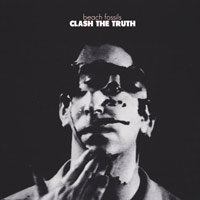
Push the Sky Away
Bad Seed Ltd.
It’s been roughly 30 years since Nick Cave emerged from gloom-and-gunk progenitors The Birthday Party to establish a new identity as a solo artist. With Birthday Party guitarist Mick Harvey also a founding member of Cave’s backing band, the Bad Seeds, Cave’s initial releases under his own name weren’t all that different from his previous work. But in the subsequent years, Cave and his cohorts, who now only count Barry Adamson from the original Bad Seeds line-up, have increasingly abandoned the caustic sounds of their younger years, with the singer taking on a persona more akin to Leonard Cohen than Lux Interior.
Depending on one’s point of view, the refinement Cave has exhibited on recent albums is either a natural evolution of his darkened aesthetic or it is the watering down of what once was a jarring deconstruction of rock’s most basest components. Both takes probably hold some weight, so it’s best to try to approach each addition to the Aussie warbler’s catalog with an open mind.
Push the Sky Away, the 15th album by Nick Cave & the Bad Seeds, exhibits many of the traits of the group’s past work—brooding atmospherics, lyrical allusions to both the sacred and the sacrilegious, Cave’s deep bellow—but there’s a greater subtlety present than heretofore. Most tracks are built atop one of Warren Ellis’ loops, but there is nothing redundant about the record. “We No Who U R” fashions a smoldering keyboard line to a crackling rhythm, while Cave emits couplets that seem transcendental in their meaning. “We Real Cool,” while seemingly much more ominous in tone, works in a similar way. Ellis loops a bass rumble on which he layers his own violin work, while Cave strings lines together that seem mysterious even when making mention of Wikipedia. Cave’s contributions exhibit a certain cleverness, especially when he references the writing of another song on the album on “Finishing Jubilee Street.” If I’m completely honest, I’ll probably always prefer the Nick Cave of From Her to Eternity and Tender Prey, but it’s also hard not to feel the gravitas of Push the Sky Away.
Stephen Slaybaugh

You’re Nothing
Matador
Were Iceage a band in concept alone, it's certain they'd still be incredibly effective in rallying a restless youth movement behind their quasi-revolutionary, quasi-pagan iconography, their bleak but inspiring world view, their expertly packaged product, and those pocket knives and locks of hair they shill. Even before you put on You’re Nothing for the first time, you encounter the concept-over-content approach the Danish quartet employ with the deft hands of seasoned artists. The ominous cover of a cloaked falcon, the zine-inspired booklet of lyrics and blurry show pics, and the blacker-than-black sleeve that houses the vinyl all signal that even though this past year has been a giant whirlwind for the band (particularly jumping to Matador for their sophomore album), they have yet to abandon the “punch first, explain later” immediacy of their debut. There’s also the experiential hiccup that will come from listening to You’re Nothing on vinyl; where we are trained to play an LP at 33 rpm, Iceage opt for 45. It’s not just the punk thing to do, it’s an emblem of Iceage pushing things forward.
Topping the urgency of New Brigade was no easy feat, but You’re Nothing lays waste to that record's blitzkrieg in its first two songs, “Ecstasy” and “Coalition.” Both thrive on the hornet’s nest of guitars burrowed into the group’s churning maelstrom of post-hardcore. “Post” because Iceage could have easily mimicked the ethos of the past, yet prefer a scorched earth policy, building on top of the rubble with actual melodies and rousing, fully formed anthems made from scraps. Iceage are increasingly aware of themselves as songwriters and what it takes to evolve. You’re Nothing is laden with maturity guised as textures. There are pounded piano chords among the rise of “Morals,” and a jangly pop song in “In Haze” that is put through a wringer of amphetamines and flesh wounds. There is an addictive quality that is sonically charged and not prone to dissection using references to dead poets and implied thematic arcs. Like the title of the album suggests, we are insignificant among the widescreen of life, but that doesn’t mean we can’t revel in the now every time a riff is slashed on the punishing “It Might Hit First.” You’re Nothing is a fountain of youth and a high concept met twofold in execution. I’d be a proud papa were I to have a 14-year-old son, rebellious and tapping into this sort of wellspring. I’d even help him hang his Iceage pennant.
Kevin J. Elliott
MP3: “Coalition”

Clash the Truth
Captured Tracks
Clash the Truth, the second album for the Brooklyn-based Beach Fossils, not only represents the band’s first extended excursion into the formal studio setting, but it also marks a decided step forward in the band’s sound. In a sense, the album finds the band fulfilling the potential hinted at on its self-titled debut and the What a Pleasure EP. Head Fossil Dustin Payseur stays true to the atmospheric indie rock for which the group has been known, but the talents of the band’s other members sound fully integrated into the songs on this record.
The title track kicks off the album energetically, with jangly guitars propelling the song under Payseur’s slightly disaffected vocal. The electricity of the song contrasts nicely with the deceptive dreaminess of “Sleep Apnea,” another early highlight of the album. The guitars so prominent throughout Clash the Truth take a back seat on the great instrumental “Modern Holiday,” which sounds like a sonic sunrise and segues perfectly into “Taking Off Stern,” which features an intriguing dynamic of rumbling verses and soaring choruses. By the time the ringing guitar riffs of the album closer, “Crashed Out,” come along, it’s clear that Beach Fossils have established a prime position among the roster of Captured Tracks.
Ron Wadlinger

Holy Fire
Warner Bros.
With 2010’s Total Life Forever, Foals proved themselves capable of producing an album that worked on a multitude of levels. The record combined pop smarts, a literary sensibility, and a heightened sense of urgency into an undeniably groovy pill able to cure even the worst cases of post-millennial ennui. In short, the album was the shiznit.
One gets the sense that with the band’s follow-up, the recently released Holy Fire, that the band is attempting to replicate the same kind of euphoria. There is something inherently larger-than-life about Holy Fire, something that feels like U2’s most regal moments, even though the two bands have very little in common. This grandiose quality is built into the record from the start, with the opening “Prelude” quickly building to a fevered pitch and tracks like “Bad Habit” and “Providence” exhibiting similarly majestic airs. While the band is able to pull off such big songs, it is the lighter moments, however, that are truly golden. “My Number” works a jaunty groove to good effect, snare cracks emphasizing each time singer Yannis Philippakis declares, “I feel alive!” It is the perfect sentiment for the band to embrace, as Holy Fire shows that this is a band who eschews insincerity and ephemeral sonics to create music that really matters.
Stephen Slaybaugh

Vertikal
Density
Pigeonholing a band like Cult of Luna into the post-metal genre is like trying to cram Aphex Twin into a category that isn’t electronic music. So much of Cult of Luna’s sound is metal—be it of the doom, hardcore, death, sludge, art, or even glitch variety—that it’s painfully boring to say it is somehow beyond metal. If anything, on Vertikal, the band has turned into a weird sort of headbanging symphony orchestra. The circle pit parts sound more like Quicksand than any of that crab-core junk that passes for metal on the Warp Tour.
However, I’m afraid they may be comfortable playing to that crowd rather than tattooed beardos in a cloud of weed smoke. Judging from the opening track, “The One,” you might think this was going to be a Nine Inch Nails record pitch-shifted down. But when “I: The Weapon” kicks in, it is clear that this is a metal record. “Vicarious Redemption” spends the better part of six minutes with some serious Swans-like plodding in sargasso atmospherics before the rock music kicks in. This is where Cult of Luna burns through that ambient fog and into the icy clarity of fist-smashing metal. However at the song’s 11-minute mark, they inexplicably break into dubsteb wub-wub. I can sort of see the appeal, but I hope these dudes had that part written before the NFL started using dubsteb in their commercials. Elsewhere, electronically focused tracks like “The Sweep,” “Disharmonia” and “Mute Departure,” make me wish I could pair these dudes with Trent Reznor for a new super-group. While Vertikal might have been a bit more palatable without the Cookie Monster lead vocals (everything would be, to me), there is enough droning weirdness to satisfy the bongripper in me.
Michael P. O’Shaughnessy
ALBUM REVIEWS
Paint Fumes, Uck Life
Roc Marciano, Reloaded
Tracey Thorn, Tinsel and Lights
Jah Wobble & Keith Levene, Yin & Yang
Mogwai, A Wrenched Virile Lore
Memory Tapes, Grace/Confusion
Ex-Cult, Ex-Cult
Imani Coppola, The Glass Wall
Departures, Still and Moving Lines
The Evens, The Odds
Vinyl Williams, Lemniscate
Kylesa, From the Vaults, Vol. 1
Junkie XL, Synthesized
Dinosaur Jr, Chocomel Daze
